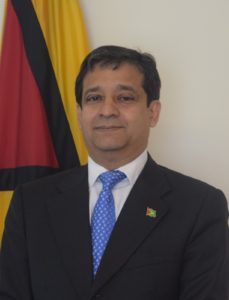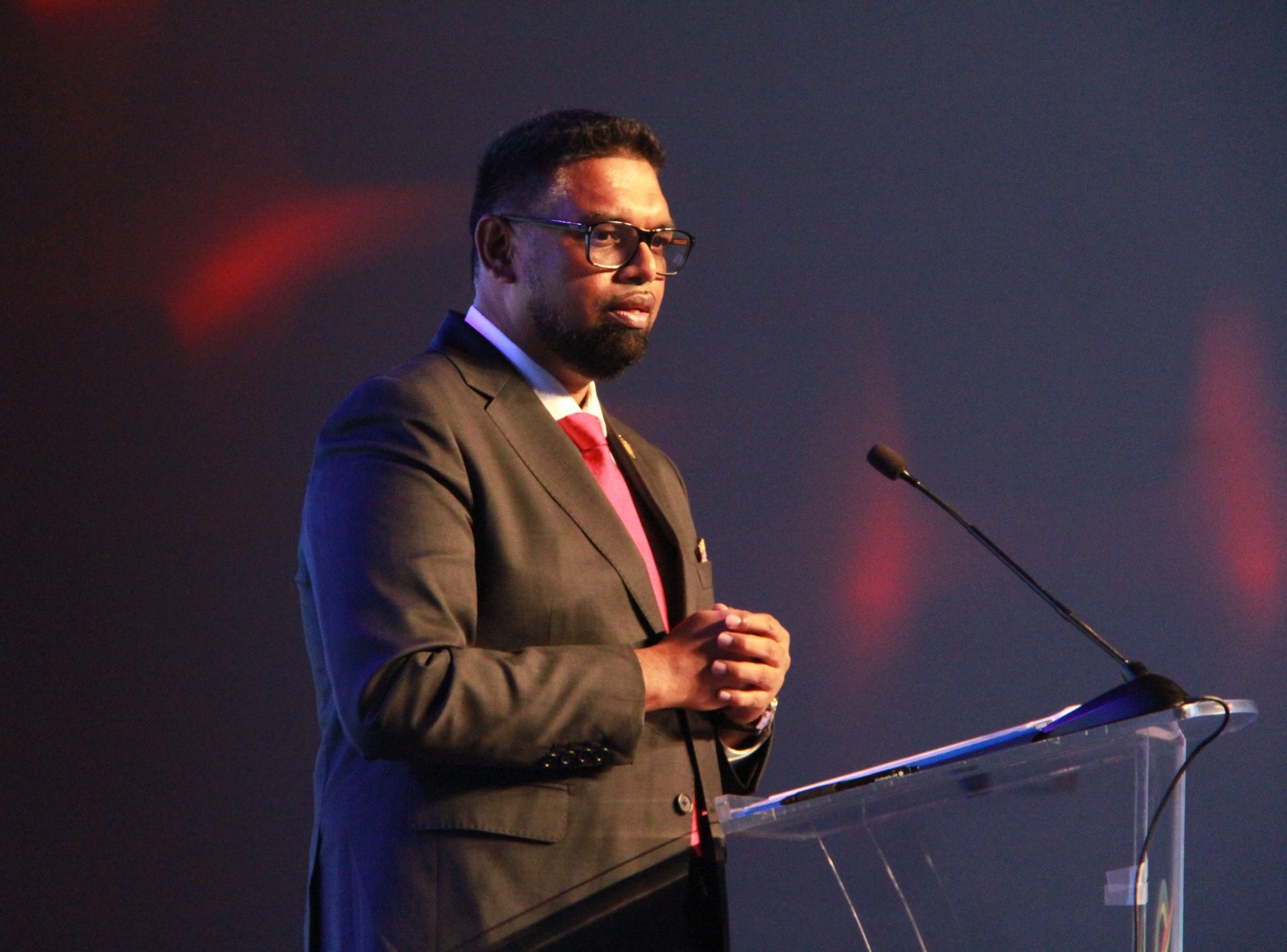By Dr. Riyad Insanally – OilNOW
Introduction
On January 24 last, the Kaieteur News (KN) reported that an erroneous map of Guyana was used by Rystad Energy, as part of a panel discussion at the recently held Trinidad and Tobago (T&T) Energy Conference. The offending map showed part of the Stabroek Block as belonging to Venezuela. Curiously, there was no Guyanese official on the panel, which dealt with “The role the Southern Caribbean can play in meeting the global demand for natural gas and petrochemicals” but, fortunately, KN publisher Glenn Lall brought the matter to the attention of the Conference organisers and President Irfaan Ali. Following the President’s intervention, the T&T Energy Chamber apologised “unreservedly” and disseminated a new map.
This is just one example of the need for continuous vigilance regarding the demarcation of Guyana’s borders. Mr. Lall’s alertness and President Ali’s action were commendable. One can only hope that the egregious error had also been spotted by Guyanese government officials and private sector representatives in the room and that they were lining up to make their objections known.
President Ali is clearly the chief spokesman at international forums for Guyana’s new-found status as a rapidly evolving energy producer. This is good given the need for the Head of State to be at the forefront of Guyana’s energy diplomacy. One therefore expects that he is ensuring he has at his disposal the expertise and support necessary to present the country’s energy policies and imperatives in the best possible way.

Energy Diplomacy
In August 2022, I was invited to deliver closing remarks at a ground-breaking course on Energy Diplomacy, organised by the Diplomatic Academy of the Caribbean, housed at the Institute of International Relations, at the St. Augustine Campus of The University of the West Indies.
Most of the course participants came from T&T’s public and private sectors, with a sprinkling coming from other Caricom countries. There was only one participant from Guyana, who seemed to have signed up of her own accord. There was no one from the Ministry of Natural Resources or the Ministry of Foreign Affairs.
The virtual course focused on global energy governance and the dynamics of global energy politics, as well as on the importance of foreign policy and diplomacy in the quest for energy security. Unsurprisingly, there was also a focus on Guyana’s emergence as an oil producing state, which has tremendous implications for Caricom. The course’s scope and structure, designed by Professor Anthony Bryan, were comprehensive and well-thought out. It was both timely and necessary and should serve as a template for future training in an area critical to Caricom’s economic development and security.
The Need for Energy Security
The need for energy security, not only in the Caribbean but across the world, has become more acute following Russia’s invasion of Ukraine and the disruption to the global energy market. Against this backdrop, the quest for new supplies and the prospects of new investments could be advantageous to the Caribbean in two respects: i) the exploitation of hydrocarbons in Guyana, Suriname and T&T, and exploration in other parts of the region; and ii) accelerating the transition to renewable energy.
For the Southern Caribbean, in particular, with huge reserves of high quality, sweet, light crude in Guyana and potentially Suriname, as well as abundant natural gas in T&T, the increased global demand for oil and gas is a good thing. As Western nations push for augmented production, there is an opportunity for Guyana and T&T to help alleviate supply concerns and increase their geopolitical influence. With a coordinated policy, these countries should be able to leverage their resources to position themselves better in their relations with the United States and the European Union (EU), in spite of the movement away from hydrocarbons to renewables.
On the other hand, even with Guyana’s impressively rising rates of oil production, it and most Caricom countries are heavily reliant on imported fossil fuels, so much so that increasingly volatile pricing can wreak havoc on their budgets. They furthermore have some of the highest average electricity costs in the Americas. It will be some time yet before Guyana can play the role many hope it can play in anchoring regional energy security. But, with informed energy diplomacy, it can start manoeuvring to take advantage of the current global energy scenario to attract bilateral and multilateral support for capacity building, investments and technology transfers to support both the energy transition in the context of the Low Carbon Development Strategy (LCDS), as well as downstream development.
Energy Dependence is Energy Insecurity
Europe’s dependence on Russian energy has hitherto given Russia tremendous leverage in its relations with the EU. In the face of Russia’s weaponisation of oil and gas, the EU is working to correct this strategic blunder. But the lesson is clear: energy dependence is bad; it is tantamount to energy insecurity.
Recognising this reality, Caricom Heads at their July 2022 meeting in Suriname, devoted considerable time to energy security and agreed on the following:
- Approval of a paper on Economic Development and Energy Transition and Climate Change as the Community’s “overarching strategy in advancing energy security”;
- Increased “focus and investment in energy security by utilising and harnessing hydrocarbon resources in the region towards reducing dependency on external resources and supplying the growing global needs arising out of the Russia-Ukraine conflict”;
- The pursuit of “energy diversification and security through making use of significant assets in the Region with immediate existing capacity in LNG and fertiliser for agriculture”;
- The development of the renewable energy sector “through building infrastructure to meet regional power generation needs”; and
- Urging the United States to remove the sanctions on Venezuela to allow for countries in “the region to benefit from the PetroCaribe initiative and for progress on the exploitation of cross-border natural gas fields between Trinidad and Tobago and Venezuela”.
The first four objectives make perfect sense in the current global energy context. They will, of course, require the deployment of appropriate resources – human, financial and technical – to ensure implementation. T&T’s desire to exploit cross-border natural gas fields in the adjoining maritime area with Venezuela is also understandable. The announcement on January 24 that the US has approved the waiver of sanctions to allow T&T to develop the Dragon Field in Venezuelan waters has therefore been welcomed across the region.
One hopes, however, that it is not Caricom’s intention to put its eggs once more into the PetroCaribe basket, which would be a resurrection of not only energy dependence but also debt dependence. Of course, Barbados and T&T never did sign on to PetroCaribe. And Guyana only took 50% of its needs under PetroCaribe for strategic reasons, until the arrangement fell apart in 2015 when Venezuela began to raise the temperature over its claim to Guyana’s territory and maritime area. If anything, those Caricom states that were party to PetroCaribe would do well to recall the precarious position they found themselves in after its collapse, especially with no guarantee that Venezuela will be able to become, in the short to medium term, a reliable supplier to the Caribbean.
Caricom needs to avoid dependence on PetroCaribe and, for that matter, any other arrangement that leads to greater energy insecurity. Indeed, it needs to become less dependent on expensive, imported fossil fuels. To do so, though, Caricom countries will need to find ways to move towards energy efficiency and a certain degree of self-sufficiency, in other words, energy security.
One possible avenue for achieving this is the US-Caribbean Partnership to Address the Climate Crisis 2030 (PACC2030) and its promise to promote the energy transition and energy resilience in the region. Although concrete details are scarce, with proper engagement and negotiation, assistance should be forthcoming to build capacity in individual countries and regionally, and to establish investment facilitation teams to unlock new financing for climate and clean energy projects in the Caribbean. Ultimately, success will depend on how Caribbean governments develop and present a joint strategy in negotiations with the US, to take advantage of PACC2030’s potential.
Conclusion
The PACC 2030 negotiations, the follow-up to COP 27 and the pursuit of the Sustainable Development Goals, among other processes, will necessitate robust and well-coordinated energy diplomacy by Caricom. Achieving the transition to renewable energy and ensuring energy efficiency and energy security, as well as leveraging the Southern Caribbean’s energy resources, will require technocrats and diplomats capable of advancing the region’s energy interests, in a volatile and sometimes contradictory global environment. The harmonising of regional policies and frameworks to achieve economies of scale will also be critical for success. This, arguably, is the future of energy diplomacy in the Caribbean.
As the emerging leader in the Caricom energy space, Guyana is poised to play a pivotal role in all this. The 2023 budget has allocated GY$45 billion (up from GY$33 billion in 2022) to the education sector and GY$500 million (approximately US$2.3 million) has been earmarked from a World Bank US$20 million loan for building institutional capacity for the management of the oil and gas sector in the Ministries of Natural Resources, Public Works and Finance, the Geology and Mines Commission, and the Environmental Protection Agency. It is not clear how much of the Foreign Ministry’s allocation is to be spent on training Foreign Service Officers, but it is to be hoped that some of the funds in the budget destined for education and capacity building will be spent on training in energy diplomacy.
Guyana has all to play for. There is a definite need for a new cadre of diplomats and other public officials imbued with a deep understanding of the geopolitics of energy and equipped with the skills to navigate the interlocking worlds of climate change and energy security, and to negotiate in the best interests of Guyana and the region. Indeed, members of the private sector could also benefit from such training.
About the Author
Dr Riyad Insanally, CCH was a career diplomat for 31 years and last served as Guyana’s Ambassador to the United States of America and Permanent Representative to the Organization of American States, from September 2016 to June 2021. He is currently a Senior Fellow at the Caribbean Initiative of the Atlantic Council’s Adrienne Arsht Latin America Center, in Washington, DC.



